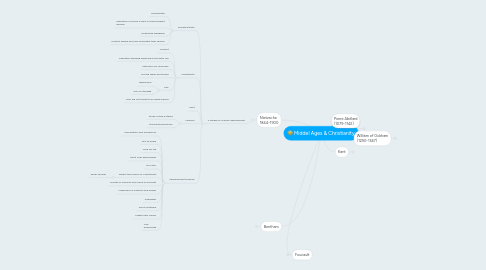
1. Nietzsche 1844-1900
1.1. 4 stages of Human development
1.1.1. Socrates/Plato
1.1.1.1. Psychopath
1.1.1.2. Alienation of life by Forms in transcendent domein
1.1.1.3. Destroyed tragedies
1.1.1.4. Instinct should be more important than reason
1.1.2. Christianity
1.1.2.1. Corrupt
1.1.2.2. Alienation through believing in the after life
1.1.2.3. Platonism for dummies
1.1.2.4. For the weak and stupid
1.1.2.5. Pity
1.1.2.5.1. depressive
1.1.2.5.2. loss of strength
1.1.2.6. Men are not made to do always good
1.1.3. Kant
1.1.4. Nihilism
1.1.4.1. Study of the nothing
1.1.4.2. Start with positivism
1.1.5. Übermensch/overman
1.1.5.1. Completion over perfection
1.1.5.2. Will to powe
1.1.5.3. Love for life
1.1.5.4. Artist over philosopher
1.1.5.5. No critic
1.1.5.6. Reject the illusion of Christianity
1.1.5.6.1. never sinning
1.1.5.7. Master of morality over slave of morality
1.1.5.8. Happiness is instincts and power
1.1.5.9. intelligent
1.1.5.10. Don't overthink
1.1.5.11. Create own values
1.1.5.12. Live passionate
2. Bentham
2.1. Ideal prison/ power control system
2.1.1. big tower in the middle who can see all the cells, cells can't see whether someone in the tower is watching yes or no
2.2. Efficiency
2.3. Gaze
2.3.1. power
2.3.1.1. the sense that someone is watching
2.4. Everybody watches each other
2.4.1. Because, who watches the watchers
2.5. Panopticon
2.5.1. Utopian solution for society
3. Foucault
3.1. Power
3.1.1. Disciplinary power
3.1.1.1. 18th/19th century
3.1.1.1.1. people start taking records of each other
3.1.1.2. Social pressure
3.1.1.2.1. follow norms
3.1.1.3. Power relations
3.1.1.3.1. Schools
3.1.1.3.2. Prisons
3.1.1.3.3. Clubs
3.1.1.3.4. the Gym
3.1.1.4. 2 types
3.1.1.4.1. Punishment
3.1.1.4.2. Skills and Knowledge
3.1.1.5. Good
3.1.1.6. Productive
3.1.2. Repressive power
3.1.2.1. Obedience to the King/ Law
3.1.2.2. Forcing someone
3.1.2.3. Doing something against your will
3.2. Utilitarianism
3.2.1. Look at the consequences of actions
3.2.2. Greatest happiness for the greatest number
3.3. Panopticon
3.3.1. dystopian solution
3.3.2. could be more sophisticated
3.3.3. Labaratory of power
3.3.3.1. People controle each other and oneself
3.3.3.1.1. Fear of Abnormality
3.3.3.1.2. Fear of isolation
3.3.4. Reduced to a method of power
3.3.5. e.g. Gaze => greatest standards in society
3.3.5.1. Females pretty, male athletic
3.3.5.2. Internalize the gaze
3.3.5.2.1. feel the need to aim at the standards within
3.3.6. Nowadays
3.3.6.1. control through
3.3.6.1.1. cookies
3.3.6.1.2. schools
3.3.6.1.3. everyone around us
3.3.7. Neutral
3.3.7.1. institutions give norms
3.4. Conceptualist
3.4.1. Illusion of pleasure is enough
3.4.2. Only consequences are important
3.5. Nietzsche influence
3.5.1. Will-to-power
3.5.1.1. power relations which exist between living beings
3.5.2. Christianity imposes power
3.5.2.1. pity
3.5.2.2. Institutions as well
4. Pierre Abélard (1079-1142)
4.1. Sin
4.1.1. = Consent & Intention
4.1.2. a weakness
4.1.3. Only when one knows his doings are wrong
4.1.4. lust
4.1.5. = the inner consent to go against God
4.1.5.1. e.g. monk forced to be arround beautiful women
4.1.5.1.1. he does not sin
4.1.6. Deed is irrelevant
4.1.6.1. Common to st Augustine
4.2. Difference between
4.2.1. Will
4.2.1.1. Desires
4.2.1.2. Wishes
4.2.2. Intention
4.2.2.1. Cause of good or evil
4.2.2.2. Evil intention
4.2.2.2.1. going against God while knowing
4.3. Conceptualist
4.3.1. viewing in concepts
4.4. Will
4.4.1. Consent
4.4.1.1. Act
4.4.1.1.1. =the doing
4.4.1.2. = The commiting, deciding to...
4.4.2. =Desire, wish
5. William of Ockham (1290-1347)
5.1. Nominalism
5.1.1. Universals only in our minds
5.1.1.1. not substantial
5.2. Universal
5.2.1. by convention
5.2.2. in the head
5.2.2.1. Plato& Aristotle = real horse
5.2.2.2. Ockham = horse only in our minds
5.2.3. =Singular
5.2.3.1. outside the mind
5.2.3.2. what is not universal
5.2.4. Rejection of realism
5.2.4.1. no universal definition
5.3. Forms do not excist seperately
5.3.1. only in our minds
5.4. Intention
5.4.1. First
5.4.1.1. object language
5.4.1.2. out of ones head
5.4.1.3. e.g. table, human
5.4.1.4. always connected to 2d intention
5.4.2. Second
5.4.2.1. meta language
5.4.2.2. Named in your head, concepts
5.4.2.3. e.g. object, spiecies
6. Kant
6.1. Imperative
6.1.1. Catagorical
6.1.1.1. duty by moral law
6.1.1.1.1. goal is given
6.1.1.2. Moral code
6.1.1.2.1. What if everyone would do this?
6.1.1.3. 1: Act only according to that maxim by which you can at the same time will that it should become a universal law
6.1.1.4. 2: So act that you treat humanity in your own person and in the person of everybody else always at the same time as an end and never merely as a mean
6.1.2. Hypothetical
6.1.2.1. Rules of Skill
6.1.2.1.1. conditional
6.1.2.1.2. obtained
6.1.2.1.3. problematic
6.1.2.2. Counsel of Prudence
6.1.2.2.1. universal goal
6.1.2.3. for an own goal
6.2. Moral conflicts do not excist
6.3. Everything in nature
6.3.1. works according to a law
6.4. Our will
6.4.1. = practical reason to choose which reason
6.5. Command (of reason)
6.5.1. conception of objective principle
6.5.2. formula of command
6.5.2.1. imperative
6.5.2.1.1. the things we have to do
6.6. Conceptualist
6.7. Consequences of actions = Irrelavant
6.8. Ontology
6.8.1. everything we see needs a cause
6.8.2. God? Yes but where are you

